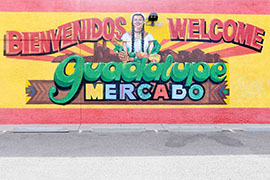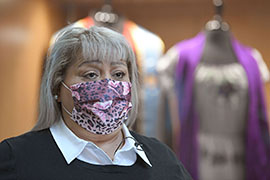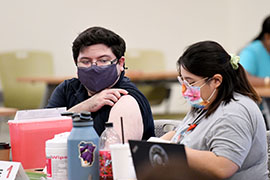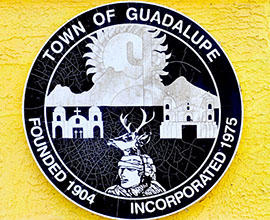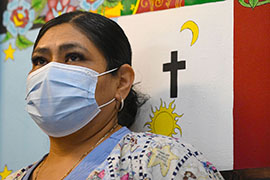- Slug: BC-CNS-COVID Guadalupe,1050
- 5 photos, web video available (thumbnails, captions below)
By Miguel Torres
Cronkite News
GUADALUPE – A mix of stigma, misinformation and bad accounting let COVID-19 run rampant through this small town in 2020. But the community stepped back from that brink by building partnerships and fostering trust to track cases and increase vaccinations.
In spring 2020, every town in the country was trying to figure out how to best deal with the rise of what would become an indefinite global pandemic.
By early summer, Guadalupe had become a hotspot – with an infection rate 4.6 times higher than that of surrounding Maricopa County, or 1,659 vs. 358 per 100,000 persons, according to a town report. Guadalupe, wedged between Tempe and Interstate 10, is home to 6,500 mostly Hispanic residents along with members of the Pascua Yaqui Tribe.
“For how small our community is, it was really bad. We were having funerals left and right,” Vice Mayor Ricardo Vital told Cronkite News.
When the pandemic was declared in March 2020, the only data Guadalupe could use to gauge COVID-19 cases came from the Arizona Department of Health Services. But because the town shares a ZIP code with Tempe, Vital said, a lot of those cases were misassigned to the city.
Leaders soon realized that the number of cases and deaths reflected in the state data didn’t match what residents were talking about anecdotally.
Through wastewater testing, conducted by Arizona State University researchers, leaders confirmed that COVID-19 was crushing their town. Maricopa County officials determined that Guadalupe needed help.
The Town Council partnered with Pascua Yaqui tribal leaders, Maricopa County, Native Health and a COVID-19 response team composed of ASU faculty, staff and students to curb the numbers with at-home testing, contact tracing and, eventually, vaccination events.
By early December 2021, case rates in the town were 196.05 per 100,000 people versus 300 per every 100,000 people countywide, but the new, fast-spreading omicron variant left officials worried.
“We haven’t seen any large spikes, but there is that concern now with this new variant and again the spikes that occur due to holiday and social gatherings,” Town Manager Jeff Kulaga said at a Dec. 9 town council meeting. “So the message is: Stay the same. We’ve been in this going on over 18 months plus now. Masks are still important. Social distancing, still important. … And most important is the vaccinations and the booster shots.”
In the early stages of the pandemic, Vital said, people were afraid to have anything to do with testing because they didn’t want to be seen as someone exposed to COVID-19.
“Within our own community, it was viewed as something shameful and something dirty to catch,” he said. “Nobody wanted to be the first family in Guadalupe to be like, ‘We have COVID.’”
Promotoras – community health workers who go home-to-home – helped ease that anxiety. They delivered food and personal protection equipment and spoke one-on-one to residents about the virus.
Among those promotoras are Veronica Perez, who has lived in Guadalupe all her life, and Graciela Holgiun, who lives in Chandler but has friends and relatives in Guadalupe.
“I’ve worked in the medical field for many years,” Holguin said, “so I thought it’d be something positive to help out people that needed it at the moment.”
They both saw what was happening on the streets during the worst of it.
“By July (2020), it started hitting a little bit home,” Perez said. “We would have at least one or two deaths per week. I think that’s when people started to realize that maybe something is really happening here.”
They spent a year and a half hand-delivering all sorts of goods to homes where families were stuck in quarantine. But the initial stigma of the virus limited the number of people they could help.
“A lot of people were hesitant to call and to let us know” if someone fell ill, Holgiun said. “So it was unfortunate, because there are a lot of community members we weren’t able to help and assist because of that.”
The two began attending community events to talk to people to help normalize asking for help.
“We would attend any public function that we could, and we would just educate the people,” Perez said. “We passed out flyers, we gave out information on how to clean your groceries when you brought them home.”
Attacking those misunderstandings and doubts meant ensuring that leaders of the town and the tribe had a unified message.
The council worked with Jose-Enrique Saldana, co-chair of the tribe’s Youth and Young Adult COVID-19 Task Force, and social media became a big part of efforts to provide updates on the disease and information about community testing and vaccination events.
“We’ve really tried to debunk the myths that are out there concerning the vaccine, trying to really share information that’s factual, that’s science-based,” Saldana said.
As of December, 44% of Guadalupe residents had at least one dose of vaccine, and 38% were fully vaccinated, according to county data. That compares with about 60% of all Maricopa County residents with at least one shot, and about 53% who are fully vaccinated.
Vital has a goal: “I want to hit at least 80%.”
Angelina Matos of Phoenix, who has family in Guadalupe, got vaccinated recently at one of the town’s events – after contracting COVID-19 at a birthday party.
“I think it was 18 of us that got infected at the same time,” Matos said. “It was just a simple dinner, you know. … ‘Come over to eat pizza, and we’ll sing Happy Birthday,’” she said. “It (the disease) was crazy, it was difficult, but thankfully no major illnesses.”
Although Matos sees more people taking COVID-19 seriously than they did a year ago, “there are still people who don’t want the vaccine.”
“I have a granddaughter who is sick, whose immune system attacks her healthy organs,” Matos said. “But her father doesn’t believe in the vaccine and has said, ‘No we’re not getting it.’”
Vital said those people who are opposed to the vaccinations must reconsider, for their own health – and that of their family and community.
“Granted, everybody has their own personal beliefs,” he said. “But it’s not just about me. It’s not just about you. It’s not just about the kids. It’s about everybody. We need to do our parts in order to make sure that we’re a town that sustains itself.”
For more stories from Cronkite News, visit cronkitenews.azpbs.org.
^__=
A mural on the side of El Mercado in tiny Guadalupe, which is home to 6,500 mostly Hispanic residents, many of them members of the Pascua Yaqui Tribe. Once hit hard by COVID-19, the community recovered by promoting masks and vaccinations. (Photo by Kevin Hurley/Cronkite News)
Veronica Perez is a promotora who lives in Guadalupe and went door-to-door during the pandemic to deliver goods and promote testing and vaccinations. “We would attend any public function that we could, and we would just educate the people,” Perez says. (Photo by Kevin Hurley/Cronkite News)
A patient gets a COVID-19 vaccine at a recent event in Guadalupe. Fighting myths and misinformation about the vaccines has been a key part of outreach efforts. (Photo by Kevin Hurley/Cronkite News)
A mix of stigma, misinformation and bad accounting let COVID-19 run rampant through the small town of Guadalupe in 2020. But the community stepped back from that brink by building partnerships and fostering trust. (Photo by Kevin Hurley/Cronkite News)
“We’ve come a long way,” says Graciela Holguin, a promotora who helped the town and the Pascua Yaqui Tribe reduce high rates of COVID-19 infection. (Photo by Kevin Hurley/Cronkite News)
